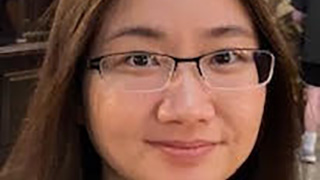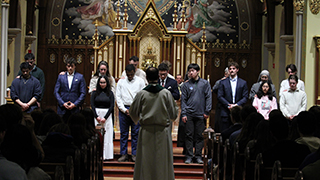Keeping Time with Algorithms: Lucy Lin, Ph.D., Models the Future of Data Science, Weather Patterns, and Wildlife Ecology
Monday, December 18, 2023

Lucy Lin, Ph.D.
Hsin-Yi "Lucy" Lin, Ph.D., is a scholar of partial differential equation and mathematical modeling who began teaching at Seton Hall as an Assistant Professor last August, as a Clare Boothe Luce Program STEM hire. Clare Boothe Luce (1903-1987) was an advocate for underrepresented women in STEM. Her foundation is the largest national private source of higher education funding for women in mathematics, science, and engineering. Lin says she felt drawn to Seton Hall because she knew leadership had an ardent desire to support women in science and mathematics.
Seton Hall is one of thirteen original institutions designated for an endowment in the late Boothe Luce’s bequest to receive financial support for hiring women in STEM – and supporting them at the beginning of their careers. Recipients of these funds support scholars like Lin to pursue their research – in Lin’s case, machine learning, AI, and data science, which many Seton Hall math and computer science students are interested in at both undergraduate and graduate levels.
"Seton Hall is a pretty teaching-heavy school, so I'm teaching three different classes," Lin says. She is leading her students in important studies on and research about data mining, and other aspects of modeling. "I set up new materials for those classes, and also applied calculus for business majors," she added.
Lin likes the collaborative nature of academia, versus industry (like working for Google or Microsoft, for example), she says, where everything is proprietary – and it is difficult to produce work that is widely beneficial. At Seton Hall, Lin can share ideas with students and other faculty across multiple disciplines, like chemistry and business. "Everybody's really active," she says of students and university colleagues. "They're interested in machine learning, and they're interested in knowing methods and technologies to see how they can apply it in their own fields."
Lin grew up in Taiwan and attended university there before immigrating to the United States. In college, she majored in physics - liking how it used abstract things to describe things she saw in real life. "I was amazed that I could actually write down something to describe the general rules of the world," she said. Motivated by the desire to build things with accuracy, Lin realized she needed to learn more math.
As a girl, she played the piano, and says she always saw musical notes in parallel to the fixed rules of mathematics and physics. In a beautiful analogy, she equates the beauty of numbers with playing the piano: "You need to start with one note, to another note, and then you have a chorus," she said. "Starting from really strict foundations, you can build up and do beautiful things. That’s how I feel about math."
Similarly, Lin sees both sides of the current arguments for and against the AI she studies but feels it has become too easy to replace a human with a computer model. "You can not only change the pitch [of a voice or sound], but you can also change the whole patterns that help people speak," she explains. "So, anyone can mimic singing, like another person’s song. And once you can do that, you don't need a singer anymore. That’s where the [media industry] panic came from."
Lin feels the policy side of working with AI needs attention. "The music industry could be in trouble because of new developments, so now the other side of machine learning is how we can prevent this type of thing and protect the assets of the music industry and the singers."
Her Ph.D. in mathematics from the University of Maryland, which she completed in 2020, concerned transport phenomena in partial differential equations and related mathematical modeling. She then spent time doing post-doctoral work as a researcher during the pandemic in Boulder, Colorado. There, Lin worked with NOAA, the National Oceanographic and Atmospheric Association, to study weather patterns, and on the National Park Service’s efforts to identify spreading dynamics of disease on white tailed deer. "I work with data and try to combine this with mathematics to create some real-world applications," she said.
Lin’s interest is primarily in data modeling: a modality that allows her to write an equation that describes the "real-world behavior" of things like weather patterns, and animals. In this way, she can help predict dangerous weather events, disease outbreaks, and more. Her favorite types of projects are interdisciplinary – using mathematics to help solve problems.
"There are so many things I'm interested in," says Lin. "All my abstract models – no matter whether you talk about speech or weather - I see the same thing."
Categories: Education, Science and Technology






